Best At-Home Kidney Test
Our guide to the best at-home kidney tests examines contenders in terms of cost, accessibility, speed, and more.

Kidney disease may be more common than you think — approximately 33% of American adults are at risk, 37 million have the disease and are unaware,1 and about 1-in-3 with a severe form of chronic kidney disease (CKD) don’t know they have it.2 Unfortunately, kidney disease often doesn’t present with symptoms until it’s advanced, which could be why it’s one of the top ten causes of death for Americans.3 With this in mind, the importance of regularly checking your kidney health becomes paramount, especially if you have another condition that can affect your kidneys like diabetes or high blood pressure.4
One of the best ways to see how your kidneys are doing is to take a blood or urine test. At-home kidney tests are an affordable and convenient option that can help you combat rising medical costs and potentially long wait times for appointments. We’ve compiled our top choices for at-home kidney tests in this guide, breaking down everything there is to know so you can make the best decision for your health.
If you’re in a hurry, here’s a quick rundown of our findings.
Top recommendations for at-home kidney tests:
- Best overall: LetsGetChecked
- Best in-lab alternative: Walk-In Lab
- Most comprehensive: Walk-In Lab
- Best on a tight budget: Vivoo
- Best blood-free alternative: Vivoo
- Most user-friendly results: LetsGetChecked
With accurate and useful results delivered quickly and clearly, the LetsGetChecked Kidney Test is your best at-home option for testing your overall kidney function.
The Kidney Test provides easy-to-read results within a week of submitting your blood sample. (Our testers got results after a mere 24 hours, complete with useful explanations of them.) To get the lowest price, buy direct and use our INNERBODY25 coupon code for 25% off.
In this Review
Why you should trust us
Over the past two decades, Innerbody Research has helped tens of millions of readers make more informed decisions about living healthier lifestyles through extensive research and testing of the products and services we review
For this guide to the best at-home kidney tests, we spent over 85 collective hours gaining hands-on experience with the test kits, poring over dozens of studies on kidney function and essential biomarkers, and researching at-home testing options across the competitive landscape. When judging products and services, we evaluate them based on their adherence to the latest medical evidence and current health standards. As that information evolves, so too will the information in this guide.
Additionally, like all health-related content on this website, this review was thoroughly vetted by one or more members of our Medical Review Board for accuracy.
How we evaluated at-home kidney tests
When we evaluate health products or services (like these at-home kidney tests) we examine the contenders based on sets of criteria that highlight the most important factors. In this case, we looked at helpfulness, cost, speed, ease of use, and customer care.
Helpfulness
Winner: LetsGetChecked
To be truly helpful in the case of kidney testing, a test should accurately measure what it attempts to measure, and those metrics should be useful for delivering information about kidney health.
In terms of accuracy, both LetsGetChecked and Walk-In Lab are equally accurate due to their use of lab-analyzed blood samples. This is not to say that Vivoo is inaccurate, but there’s the potential for the test strips to be read differently by at-home testers depending on the lighting (though our testers didn’t experience this). Additionally, urinalysis isn’t the gold standard for measuring proteins in urine.40
When it comes to what the tests are capable of measuring accurately and how useful those measurements are, LetsGetChecked surpasses Vivoo and is our recommendation for at-home kidney testing. It measures your urea, creatinine, and estimated glomerular filtration rate (eGFR), which are considered more clinically useful for understanding your kidney health. In particular, doctors utilize eGFR and creatinine testing for diagnosing kidney disease (and monitoring disease progression in those who have it). And urea levels can reveal how well your kidneys are functioning by measuring how efficiently they’re filtering out waste from your blood.
If you want the most comprehensively helpful testing option and aren’t opposed to going to a lab, we suggest opting for Walk-In Lab.
Cost
Winner: Vivoo
Since kidney disease often presents without noticeable symptoms until later stages, being able to test regularly without racking up medical bills can make a huge difference. And this is especially important if you’re one of the 27.6 million Americans who are uninsured.5
If you’d prefer to test at home, your best budget option is a one-time purchase of Vivoo’s test strips at $39.99 for a 1-month supply (four tests). Unlike Walk-In Lab, Vivoo’s tests aren’t HSA/FSA eligible, but you can subscribe to receive three ($89.99) or six months ($149.99) worth of tests and reduce the cost-per-test from about $10.00 to $7.49 (three months) or $6.25 (six months).
But if you're not opposed to visiting a lab in person to have your blood drawn, Walk-In Lab offers the lowest prices of any of our top picks ($28-$33) — and this lower cost also comes with more biomarkers tested versus close competitors. For example, the Kidney Health Test from Labcorp OnDemand costs $89 and only looks at four biomarkers, while Walk-In Lab’s Renal Function panel analyzes 12 (including those checked by Labcorp OnDemand) and costs $56-$61 dollars less. Additionally, Walk-In Lab tests are HSA/FSA eligible (as are those from LetsGetChecked).
Speed
Special offer from LetsGetChecked: SAVE 25% with code INNERBODY25
Winner: Vivoo
It’s never fun to wait for test results to come back. And when it comes to health concerns, that wait can come with a hefty dose of anxiety. Luckily, there are at-home tests out there that provide impressive turnaround times.
(An important note: If you believe you have acute kidney disease or a serious condition that needs urgent treatment, we don’t recommend you take an at-home test. Instead, it’s better to contact your doctor or go to the nearest urgent care or emergency room. Kidney failure is not something to take lightly.)
Our top at-home testing picks with the fastest turnaround times are Vivoo and LetsGetChecked. The former wins out overall due to its urinalysis results only taking about 90 seconds, but the latter is extremely impressive in its own right — our testers received their results within 24 hours.
However, only a few of the factors Vivoo checks (like hydration, protein in your urine, and urine pH) show potential links to kidney disease risk.6 7 8 If you want a test with fast results that’ll analyze more pertinent biomarkers, LetsGetChecked is your best option.
In terms of the competition, our testers received their results from Walk-In Lab (using a Labcorp facility for sample collection) within two days. And some of our runner-up choices for at-home kidney testing can take anywhere from five minutes (Minuteful Kidney) to three weeks (Verisana).
Ease of use
Winner: Vivoo
One of the perks of at-home testing is an increase in accessibility. However, if an at-home test isn’t easy to use, then that heightened accessibility is practically null and void. Taking an at-home kidney test shouldn’t require a Ph.D. While in-lab blood tests are hands-off and easy enough, not everyone lives close to a lab or has the health insurance to reduce the costs.
People who are familiar with smartphones will find that using Vivoo is a breeze. The service is intuitive and easy to navigate. The app is free to download (on both iOS and Android) and provides clear and simple instructions that are easy to find again if you accidentally skip through too fast or haven’t tested in a while.
And the Vivoo test itself is pretty straightforward: urinate mid-stream on the colored portion of the test strip, then let it sit for about 90 seconds (the app includes a handy timer) before scanning with your phone camera in-app. If you’ve ever used a bank’s mobile check deposit system, you’ll find that scanning the Vivoo strip is pretty similar. The app then measures your results and gives you an answer within a few seconds.
Minuteful Kidney, one of our runner-up choices, has a very similar testing process, even down to the use of a smartphone app. The main difference between the two is that anyone can purchase Vivoo, but Minuteful Kidney needs to be authorized by your doctor.
Customer care
Winner: LetsGetChecked
LetsGetChecked earns our top choice for customer care due to several factors: the availability of clinical support, the speed and thoroughness of the customer service team, and the user-friendly layout of the results page. All of these factors combine into an overall pleasant customer experience. The only thing that detracts from the LetsGetChecked experience is the potential for difficulty when collecting your blood sample (especially if you have poor circulation or clot fast).
Because of its ease of use, Vivoo is a runner-up in this category. However, the closest thing to clinical support that Vivoo offers are recommendations to improve your test results (like eating more flaxseed to reduce inflammation).9 These bits of advice may prove to be beneficial for your health, but they can’t really compare to the ability to speak with a nurse or other medical professional about your results.
How our top recommendations compare
Below, we’ve compiled a chart for you to reference the similarities and differences between all of our top picks and honorable mentions.
How do the kidneys work?
The kidneys are important organs that help to clean blood, regulate blood pressure and vital nutrients like potassium, remove waste and excess fluid, and more. The kidneys also release vitamin D and a number of hormones such as erythropoietin, which increases the production of and protects red blood cells.10 While the majority of people have two of these fist-sized organs,11 some individuals are born with three (supernumerary kidney),12 one, or none at all (unilateral or bilateral renal agenesis).13
When your kidneys are working properly, they remove waste and excess fluid from your body. This fluid can come from anywhere but is often found in the blood. Blood pumps from an artery in your heart to your kidneys, where it passes through millions of tiny filters called nephrons that sweep up waste products such as urea (a nitrogenous waste).10 The kidneys then transfer these wastes and excess fluid to your bladder, where they are stored as urine, while the clean blood gets cycled back into your body.10 11
A healthy kidney filters about 150 quarts of blood per day.11 That’s equivalent to 37.5 gallons — or an average curbside trash can full of blood — every single day. Your kidneys work hard to keep your body clean and toxin-free.
Kidney diseases
When your kidney function goes awry, there are a few ways that concerns can spring up. You might be familiar with kidney stones — minerals that have crystallized in your kidneys to form solid masses that can range in size from a grain of sand to a golf ball — but there are several other kidney issues that can cause problems.14 Some of these issues include:
- Urinary tract infections (UTIs) when severe and chronic or untreated15
- Cysts and polycystic kidney disease (PKD)16
- Glomerulonephritis, or damage to the nephrons17
- IgA Nephropathy, where immune system proteins aren’t properly expelled from the kidneys and damage the nephrons18
- Genetic diseases, such as nephropathic cystinosis and Fabry disease19 20
The most common kidney disease is called chronic kidney disease (CKD).21 CKD occurs when the kidneys are damaged and can no longer filter blood like they’re supposed to, leaving excess fluid and waste in your body.22 Most of what we’ll discuss in this guide is kidney health in relation to CKD since it’s more common than any other kidney disease.
What do at-home kidney tests measure?
There are a few common biomarkers that can indicate kidney troubles, depending on if you’re testing your blood or urine. The chart below breaks these down and explains how they’re uniquely important in determining your kidney health.
Glomerular filtration rate (GFR)
One of the most important measures a blood test will point out is your glomerular filtration rate (GFR). GFR is a measurement of how well the glomeruli are working. Glomeruli are the small network of blood vessels that move waste out of the kidneys.23
The glomerular filtration rate, therefore, is the rate at which the glomeruli are filtering your blood. This is an extremely important measurement, but one that’s had a bit of a troubled past with racial biases (see the FAQ for more information). As of February 2022, several major kidney and nephrology groups are advocating for a change in how clinicians measure your GFR.24 That said, it’s still one of the best measurements to see how well your kidneys are functioning. You may have either a measured GFR test (mGFR) or an estimated GFR test (eGFR).25
Blood urea nitrogen (BUN) and urea
Urea, or uric acid, is one of the main waste products that kidneys remove from the body. Blood urea nitrogen (BUN), on the other hand, is a side product created by the liver when it’s breaking down protein from food. Both are removed by the kidneys and are easy to measure in order to test how well your kidneys are actually filtering your blood.26
So, what’s the difference between BUN and urea? A BUN test measures the amount of nitrogen in the urea as well as the total amount of urea, whereas a urea test just measures the amount of the byproduct in your blood.27 A BUN test is a bit more specific to kidney function since it is a direct byproduct that funnels straight to the kidneys, and therefore is a slightly better way to test your kidney health.26
Creatinine
Like how BUN is a byproduct of liver processing, creatinine is a waste product from everyday muscle use. Every time you move your muscles, they metabolize an amino acid called creatine, which gets broken down into creatinine. Since you are always moving your muscles, creatinine is released on a steady basis and is constantly being removed by the kidneys.28
Checking your creatinine levels is a consistent way of looking at your kidney functioning since it’s a natural constant within your body. If you have high creatinine levels in your blood, it means that your kidneys aren’t filtering it out. While there are tests like a creatinine clearance test that only measure creatinine, it’s an older test that isn’t as convenient as other options.28 A creatinine clearance test takes several urine samples over 24 hours as well as a blood draw to fully measure. While some practitioners consider this test to be the “gold standard” for detecting protein in the urine, other (single urine sample) tests like albumin-to-creatinine ratio (ACR) may be more accurate when factors like hydration changes over a 24-hour period are taken into account.29
Protein (proteinuria) and abnormalities
It’s normal and expected that we have protein in our blood. When we find protein in our urine, however, is when we run into problems. The most common protein to find in urine is albumin since it’s the most common protein in our blood.30
Normally, your kidneys filter out waste and excess liquid from your blood without removing proteins or nutrients like iron and folic acid. When a kidney is damaged, it might get worse at identifying what should stay in the blood and what needs to be thrown out, meaning good proteins like albumin might be removed and concentrated in your urine.7 A good at-home urinalysis test should be able to tell you if excess levels of protein are found in your urine, which is a good first step to identifying kidney problems. However, not all urinalysis dipstick tests are as sensitive to protein as they need to be for proper diagnosis.
Albumin-to-creatinine ratio (ACR)
A better method of identifying too much protein in your urine than a simple urinalysis is called an albumin-to-creatinine ratio (ACR). Your ACR is a specific calculation of how much protein is in your urine versus how much waste is in your blood to get an overall strong sense of your total kidney function.29 This is the only major test that considers both waste not being cleaned and good proteins being removed, so it’s a great measurement for kidney health. Doctors and lab workers can do this by dividing the albumin concentration by the creatinine concentration from a urine sample.29
Who should take an at-home kidney test?
Since most people with kidney problems are asymptomatic, it can be hard to tell when you need to take a test to check your kidney function. For the most part, if you’re healthy, it’s unlikely that your kidneys will be struggling. Kidneys are easily impacted by other health concerns though, especially those that impact blood or fluid in your body. Factors that can increase your risk include:31
- Diabetes (type 1 and type 2)
- Having overweight or obesity
- High blood pressure
- Heart concerns or disease
- A family history of CKD
- Inherited kidney disorders
- Older age
If you have an increased risk of CKD, your primary care provider might use regular testing as a way of keeping an eye on your kidney health.
But, just because symptoms aren’t common doesn’t mean that they don’t happen. Some key symptoms of kidney disease to look out for include:32 33
Something that complicates things is that many of these symptoms are common in other conditions, as well — for instance, fatigue from kidney disease can look the same as fatigue from hypothyroidism or a vitamin B12 deficiency. Others, like persistent foamy urine, are indicators specific to kidney conditions.
With CKD having many non-specific symptoms or often presenting without any symptoms at all, it’s important to stay on top of your health by checking the status of your kidneys regularly. This is particularly important if you’re at a higher risk because of other conditions or a family history of kidney concerns.
Are at-home kidney tests accurate?
At-home kidney tests are just as accurate as a kidney test you’d take in a doctor's office — as long as you follow the directions. They test the same measures and use the same equations to calculate your results. And while the majority of current research seems to be about the performance of at-home COVID-19 testing,34 some more recent studies back up the accuracy of home-based CKD screening.35
Getting accurate results also depends on the type of information you want or need; this determines what kind of test is best for you. If you want to know if you have kidney damage, a urinalysis is the best way to go to look for proteins. If you want to check on your overall kidney function, blood work is better. Ultimately, though, having knowledge of both kidney damage and function can be vital, as tests for both are used to diagnose and monitor kidney disease.36
Tips for collecting an at-home blood sample
Our testers have spent countless hours gathering hands-on experience with at-home test kits of all shapes and sizes, and they’ve put together some recommendations to make collecting a blood sample at home much smoother.
- If you feel comfortable with doing so, consider skipping the alcohol wipe. It can dry out your fingertip’s skin, reducing blood flow and potentially leading to more pain during the collection process.
- Whether you plan to skip the wipe or not, wash your hands thoroughly under warm water for at least five minutes before pricking your finger.
- If possible, try to stand up while collecting your blood sample — this can help gravity work to your advantage.
- Try to avoid “milking” or squeezing blood out of your finger. This can lead to bruising and more pain. If you’re having trouble getting blood from a finger, it may be easier to just poke another one instead of trying to force it.
LetsGetChecked
Best overall
Pros
- Results are easy to read and access
- Impressively fast result turnaround
- Measures most major biomarkers for kidney function
- Subscribe & Save program may be ideal for repeat testers
- Clinical support available if results indicate issues
- HSA/FSA eligible
- Save 25% with promo code INNERBODY25
Cons
- Blood samples can be difficult to collect
- Sample collection guidelines are fairly rigid
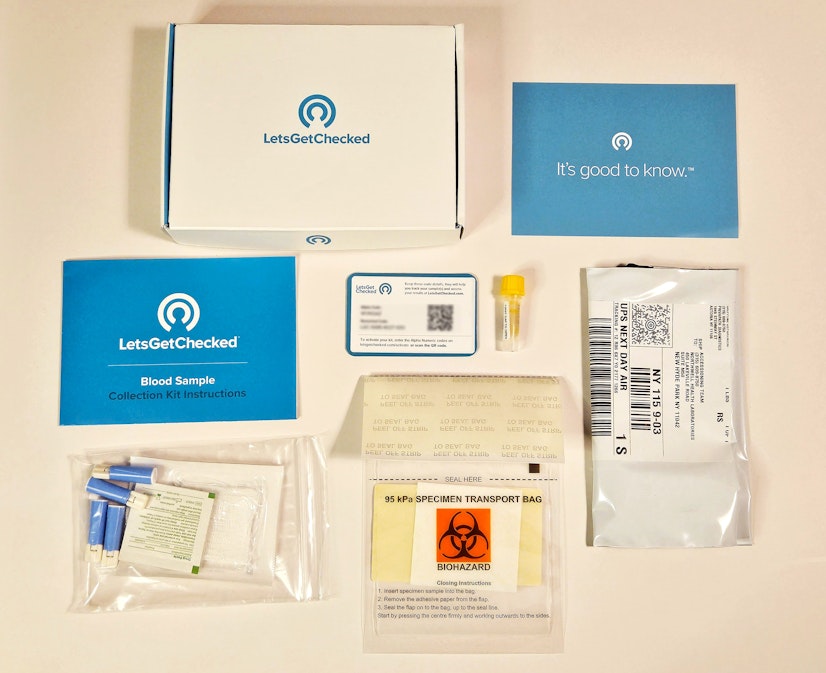
Photo by Innerbody Research
LetsGetChecked offers at-home tests for dozens of health concerns, from STDs and men’s health to thyroid levels and vitamin D. The company’s kidney test uses a capillary blood sample to measure your urea, creatinine, and estimated glomerular filtration rate (eGFR). These three biomarkers can assess your kidneys’ function. GFR and creatinine testing, in particular, are blood tests used by healthcare providers to diagnose and monitor kidney diseases.36
This test from LetsGetChecked won’t, however, be able to test for urine-specific factors, like the presence of albumin (protein). The only test mentioned in our guide that examines both urine and blood biomarkers is the Kidney Health Test from Labcorp OnDemand, which is an in-lab alternative that might not be as convenient or accessible as an at-home test.
When it comes to cost, LetsGetChecked’s kidney test may seem a bit expensive at first ($99). But, when you take into account the availability of ongoing clinical support and the speed of your results, it starts to seem more cost-effective. Compared to similar test kits, like Verisana’s Kidney Function Test, LetsGetChecked stands out from the crowd. Verisana’s test costs $119 ($20 more), only measures your BUN and creatinine levels, and doesn’t deliver your results for around three weeks.
Additionally, LetsGetChecked is one of two companies mentioned to offer subscription services for repeat testing at a discount (the second being Vivoo). If you start a subscription for LetsGetChecked’s kidney test, you’ll receive a discount based on how frequently you wish to receive tests. The price differences are as follows:
- One-time purchase: $99
- Delivered every 3 months: $69.30 (30% off)
- Delivered every 6 months: $79.20 (20% off)
- Delivered every 12 months: $84.15 (15% off)
Our LetsGetChecked testing experience
The LetsGetChecked testing experience is the only area of the service where frustrations may arise. Our testers have tried a multitude of at-home blood tests, all of which use various methods for sample collection. The easiest is a dried blood spot (DBS) test, where you need to add a few drops of blood to designated areas of a card and then wait for it to dry. LetsGetChecked used to use that method for its tests (like its thyroid tests) but swapped to using vial collection of a capillary blood sample. (The stability of dry and “wet” blood samples appears to be similar, according to researchers.)37
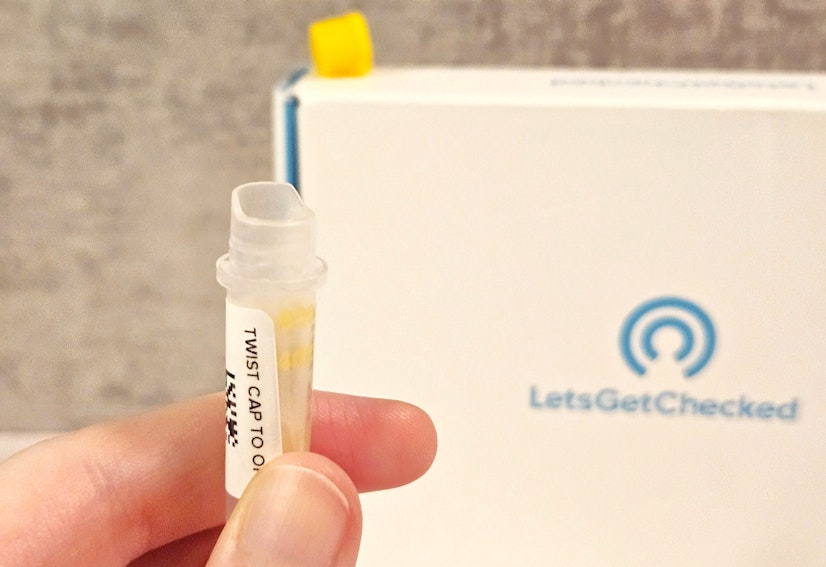
Photo by Innerbody Research
Interestingly, some testers received collection tubes with a lip on the rim (shown above), while others received tubes that did not have a lip. The lipped vials match what’s shown (color- and design-wise) on the LetsGetChecked website, leading us to believe that those are the newer, current vials that will gradually replace the un-lipped variety. We hope this is the case, as the un-lipped ones made sample collection very frustrating and time-consuming (or at least messier). This was particularly true for testers who found they clotted a bit too fast before they could fill the vial up to the necessary line.
Insider Tip: LetsGetChecked requires you to fill your collection tube up to the top line (even though there are two on the vial). An under-filled vial “will not be accepted by the laboratory.”
Before you can start collecting your sample, you’ll need to register your test on the LetsGetChecked website. The information for doing this can be found on the card included in your test kit. At the end of registration, you’ll be informed that the test is best completed on a weekday morning. This was the same thing our testers were told when trying the company’s thyroid tests, so it seems to be a consistent guideline.
You don’t have to follow this recommendation, though — you can technically take the test whenever you want. There is a little bit of research on the circadian rhythm and renal function, but, as one study notes, “the field is new and much more work remains.”38 In comparison, neither Vivoo nor Walk-In Lab state specific days or times for test completion.
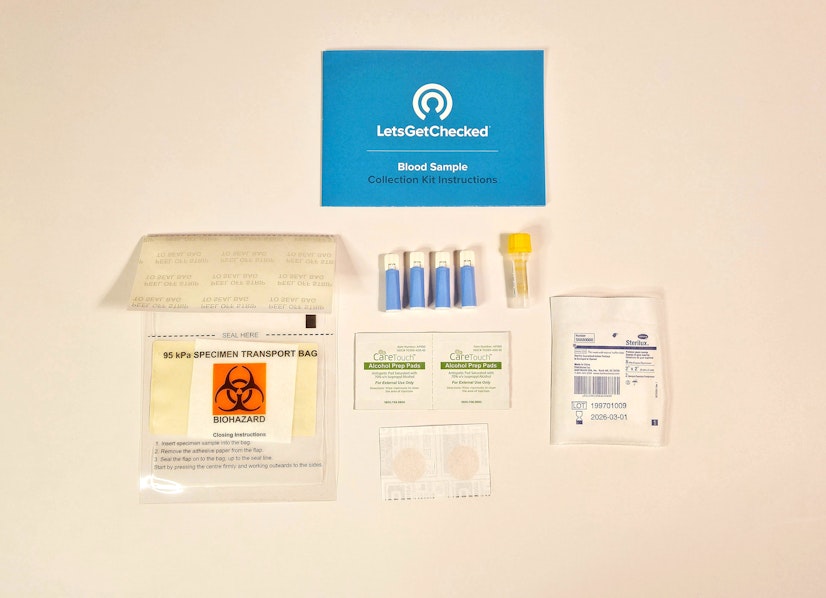
Photo by Innerbody Research
When it comes time to take your LetsGetChecked kidney test, you’ll want to clear the area of obstructions or objects that may get in the way of proper sample collection (or, worst case scenario, potentially knock over your vial of blood).
After thoroughly washing your hands or disinfecting with the included alcohol wipe, prick either your middle or ring finger on your non-dominant hand. Then, wipe away the first drop of blood, and collect the rest using the (hopefully available) lip of the vial and gravity to your advantage. Whether you have a lipped vial or not, however, the inside of the plastic collection tube is coated with a non-stick material that allows the blood to flow to the bottom instead of getting stuck to the sides.
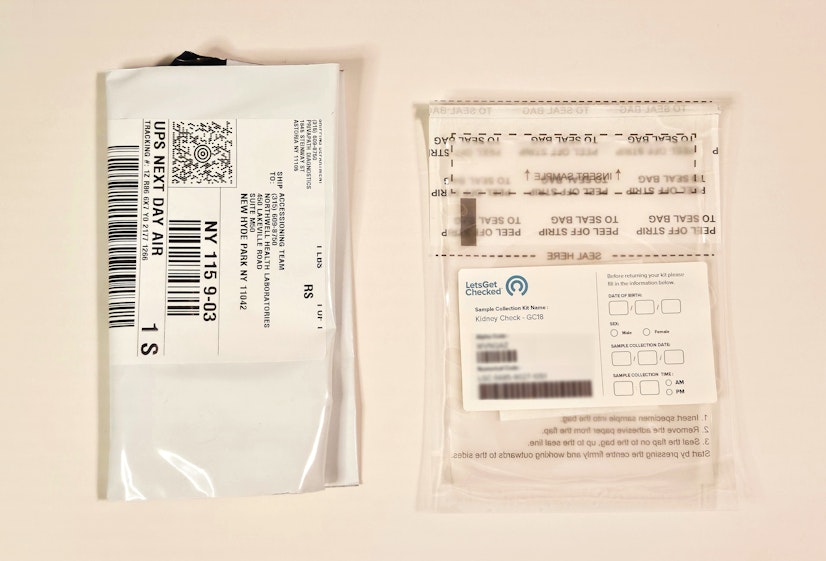
Photo by Innerbody Research
After your sample collection is complete, LetsGetChecked notes in the instructions that you need to securely replace the vial cap (it should click) and turn the vial upside down at least ten times to ensure the sample is properly mixed. You’ll then need to fill out the information on the front of the biohazard bag (your date of birth, sex, and sample collection date and time).
Once that’s complete, you can put your sample into the biohazard bag, place the biohazard bag into the LetsGetChecked box, and then place the box into the prepaid packet. It needs to be picked up by or dropped off to UPS the same day, so try to make sure you either schedule a pickup or can easily get to a drop-off location before collecting your sample.
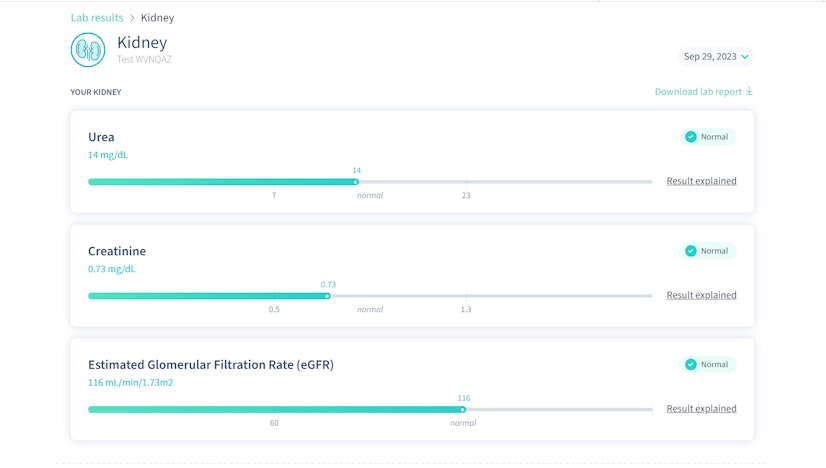
You should get an email notifying you that your results are available within five business days. As mentioned previously, our testers received theirs within 24 hours after sending the sample off to the lab. These results are straightforward, easy to understand, and can be charted over time (all of which you can also do with Vivoo). Additionally, each result includes a description of what purpose the test serves.
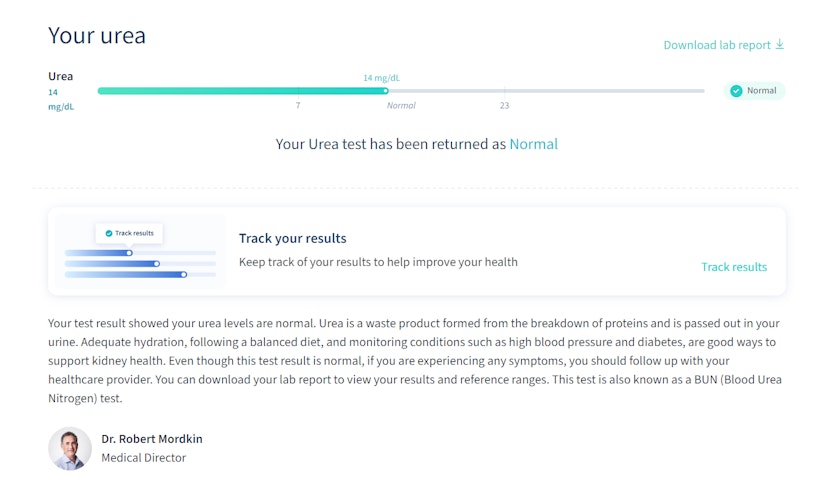
To learn more about LetsGetChecked, you can check out our full review of the service.
Walk-In Lab
Best in-lab alternative, most comprehensive
Pros
- Large catalog of laboratory tests to choose from, including several kidney ones
- Competitive pricing that’s much lower than competitors
- Offers most comprehensive labs
- HSA/FSA accepted
Cons
- Renal panel requires fasting for 12 hours
- Quality of experience varies by lab
- Can be inconvenient, particularly in rural areas with few labs
- Difficult to pick the right lab test or panel if you’re unsure which fits your needs
Walk-In Lab is a middleman that helps you find the best lab order for your money. The company compares individual tests from different services like Labcorp and Quest Diagnostics to help you find the right test for you at the lowest cost. There are hundreds of direct-testing panels and labs in every potential health category, from kidney health and cancer screening to drug tests and allergy testing.
While both the Labcorp and Quest Diagnostics sites explain it can take up to two weeks to get results, Walk-In Lab quotes results in 1-2 days. Our testers found that this timing varied depending on the location of the lab itself, from same-day results to waiting about a week. On average, though, it took about 2-3 days. This isn’t as fast as the results from LetsGetChecked, but it’s still pretty quick.
Even though we focused on Walk-In Lab’s Renal Function Blood Test Panel, searching for “kidney” on the website brings up 262 results. Some of these tests are more relevant than others, and it can be daunting to scroll through the massive list trying to find the best one. We recommend the Renal Function Blood Test Panel for its efficient combination of low pricing and comprehensive results. This panel covers 12 different blood biomarkers, including:
You may have noticed that Walk-In Lab’s Renal Function panel includes an albumin blood test. In the LetsGetChecked section above, we mentioned that this is usually a urine test when checking for kidney disease. Interestingly, albumin blood tests are actually more commonly used to measure liver function.39 Low albumin in the blood can point to kidney disease, but it can also indicate liver disease or even thyroid disease. This makes results for blood albumin level testing less conclusive compared to urine tests.
Pricing for Walk-In Lab’s Renal Function Blood Test Panel varies depending on which lab you decide to use: Labcorp ($33) or Quest ($28). Both options test the same biomarkers, and both require you to fast for 12 hours beforehand, so feel free to select the lab that works best for you. If you’re looking for a urine test for albumin, you may want to consider one of Labcorp OnDemand’s urine-based kidney tests, like its Albumin to Creatinine Ratio Test ($69) or Urine Analysis Test ($29).
Insider Tip: Walk-In Lab can’t help you test via Labcorp labs in Massachusetts, Maryland, New York, New Jersey, or Rhode Island. And it can’t help you test via Quest Diagnostics labs in Arizona, New York, New Jersey, or Rhode Island. If you’re located in one of those states, you might look into a similar service called HealthLabs. It also offers a Renal Function Panel that tests the same 12 biomarkers (also at a Labcorp or Quest location) but costs $49.
Our Walk-In Lab testing experience
Having your blood drawn in a Labcorp or Quest facility is basically the same experience that you’d have if your doctor ordered bloodwork for you. For the Renal Function panel, you’ll need to fast for 12 hours. Once that time is up, you can either walk in or book an appointment online. We recommend the latter, however, as every lab is different. And if you think a certain time or day of the week won’t be busy, chances are other people are thinking the same thing. In our testers’ experience, appointments can make or break your lab visit. Also, do note that you’ll have to go to the same lab type, Labcorp or Quest, that you purchased the test for.
Insider Tip: Some locations may require you to make an appointment. For instance, we found that a few Labcorp locations within Walgreens were appointment-only.
The test itself is the easy part of Walk-In Lab, the real challenge comes beforehand — determining what test you should choose. If you’re new to the world of kidney tests and what the most important biomarkers are, then the massive list of 200+ results for the term “kidney” on the Walk-In Lab website can be extremely daunting. From Wellness Essential Blood Test panels to Urinalysis with Microscopic Examination tests and everything in between, there’s a lot to take in. There’s even an outdated listing for LetsGetChecked’s kidney test from back when it was a dried blood spot test.
With so much to choose from, we recommend the Renal Function Blood Test Panel. It's a fairly comprehensive test that costs much less compared to the competition. Opting for Walk-In Lab over LetsGetChecked will mean you won’t have potential subscription savings or the at-home test convenience, but those perks may be better suited for those who need to test frequently. If you’re just curious about how your kidneys are doing, Walk-In Lab could be a good first step. Plus, it offers an excellent and affordable alternative for those who have difficulty performing their own blood draw or who aren’t covered by insurance.
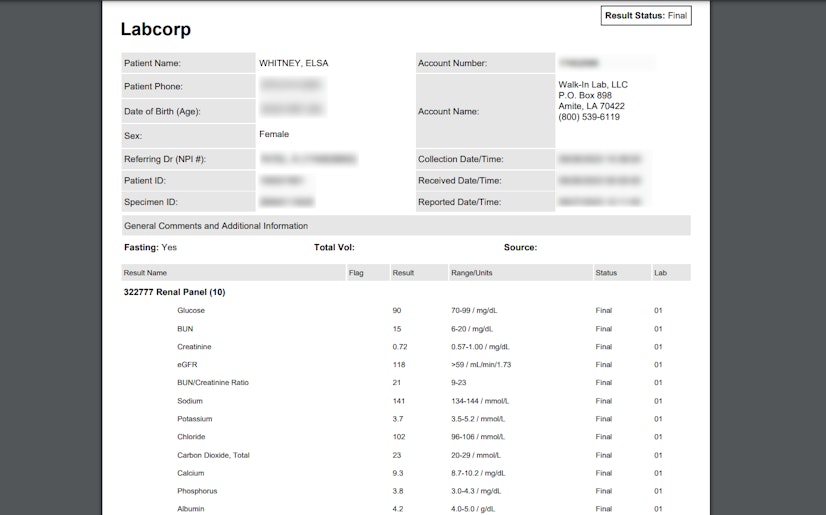
In terms of the results, the PDF you’ll receive is pretty plain and clinical. It doesn’t have the colorful pep of Vivoo’s or the user-friendly explanations of LetsGetChecked, but you’ll get your results, the normal range for that test, and flags for any unusual values.
Vivoo
Best budget pick, best blood-free alternative
Pros
- Analyzes 12 different parameters
- Personalized nutrition and wellness advice based on urinalysis
- Free app provides fast, easy-to-use testing from home
- Results are clear and understandable
- Nice alternative for those squeamish about blood
- Can be used for tracking ketones on the keto diet
- Take 20% off with code innerbody20
Cons
- Urinalysis dipstick tests aren’t the best at measuring urine proteins
- Focused more on your whole body rather than your kidney health
- Lighting can affect test results
- Smartphone is required
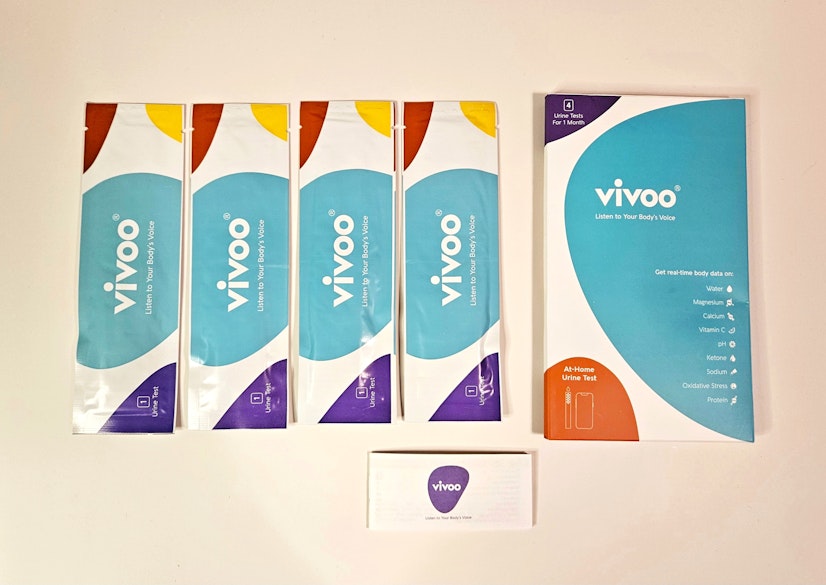
Photo by Innerbody Research
Vivoo is a bright and intuitive app that helps you to monitor your body’s wellness through regular urinalysis. Even though urinalysis dipstick tests aren't the gold standard for detecting urine proteins, Vivoo is a convenient and easy way to check how your kidneys and body are doing.40
Insider Tip: Since this test involves taking a picture of the test stick, there is the possibility that the lighting may alter your results. Our testers didn’t experience any variations in the results, however, even when they tried scanning the sticks in different locations with different lighting.
Each Vivoo test measures your levels of:
- Magnesium
- Oxidative Stress
- Water (hydration)
- Urine pH
- Urine protein
- Ketones
- Sodium
- Calcium
- Vitamin C
Out of that list, only dehydration,6 urine pH,8 and the presence of protein in the urine have links to kidney damage or CKD risk (so far).7 Interestingly, though, all of the other parameters have links to kidney function in those who already have the disease:
- High sodium levels may lead to fluid retention and, eventually, hypertension in CKD41
- In severe cases of CKD, the kidneys appear to have issues regulating magnesium levels, leading to hypermagnesaemia (high magnesium levels)42
- Lower calcium levels in the blood or urine have been linked to CKD patients experiencing kidney failure more quickly43 54
- Low calcium levels can also indicate low vitamin D,43 which can signal worsening kidney function, and those with CKD have a very high rate of vitamin D deficiency44
- The production of ketones from adhering to the keto diet (and high protein diets, in general) may not be safe for those with CKD45
So, while Vivoo can be useful to anyone curious about the wellness of their body, the tests may actually be more beneficial for those who already have CKD. Of course, if you have kidney disease, it’s best to rely on the advice and testing from your doctor, not an at-home test. However, Vivoo tests could be a potential way to monitor the status of these biomarkers and can act as a starting point for bringing up concerns with a medical professional.
Similar to LetsGetChecked, there are a couple of Vivoo subscription options available. The one-time purchase and subscription prices are as follows:
- Single purchase: $39.99 (4 tests, about $10 per test)
- 3-month subscription: $89.99 (12 tests, $7.49 per test)
- 6-month subscription: $149.99 (24 tests, $6.25 per test)
Our Vivoo testing experience
Testing with Vivoo is the easiest and most convenient testing method out of our top picks. It also provides the fastest results, with the app processing the “Wellness Score” for each of our testers in about 90 seconds.
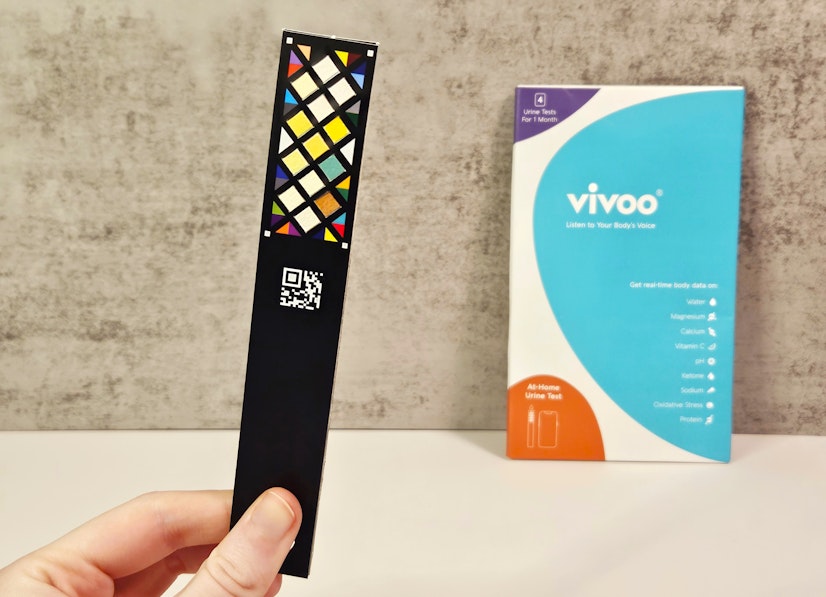
Photo by Innerbody Research
To get started with Vivoo, you’ll first be instructed to download the free app (it’s available for iOS and Android). The app is necessary to complete the testing process. You can find the app with a quick search on your device’s app store, or by scanning the QR code on the inner flap of the Vivoo packet.
Before you can take your first Vivoo test, you’ll be asked to fill out some personal information. This data can alter what makes a test result good or bad — for instance, older adults need more vitamin D.46 The questions include information about your:
- Birthday
- Goals (reason for using Vivoo)
- Weight
- Height
- Biological sex
- Activity level
- Alcohol consumption
- Cigarette consumption
- Chronic diseases and conditions
- Eating habits
- Food preferences (restrictions and allergies)
With that complete, you can touch the little rainbow-colored plus-sign at the bottom of the app and begin the testing process. Vivoo provides very clear, easy-to-understand instructions for using its urinalysis test.
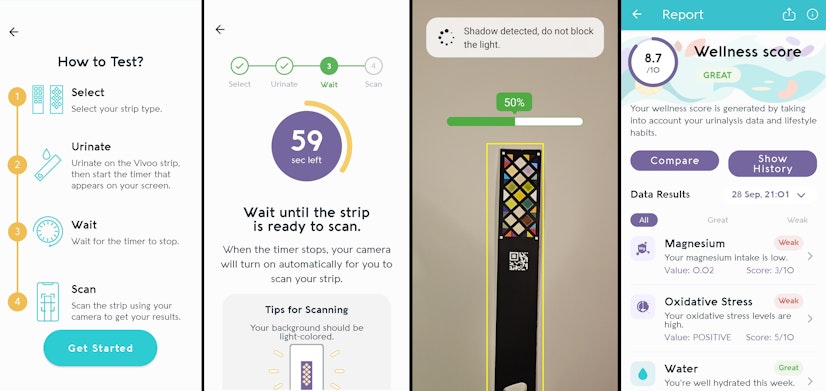
You simply select the strip type you have, urinate on the colored portion of the Vivoo strip for a couple of seconds, wait for the timer to count to zero, and then scan the strip with your phone camera in-app. Within a few seconds to a minute or so, you’ll receive your total Wellness Score and individual biomarker results.
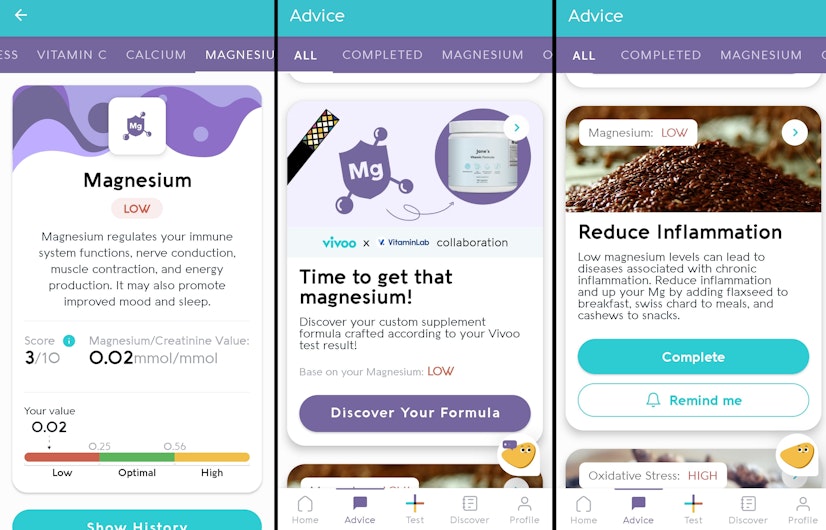
Similar to LetsGetChecked, Vivoo explains what each biomarker means. And, if something gets flagged as unusual, Vivoo will provide tips or “Advice” to help correct it. This can range from custom vitamins from partner companies to dietary changes and more.
At-home kidney test honorable mentions
These tests didn’t make the cut as top recommendations for one reason or another, but they still may be interesting to you. Below, we break down what each service has to offer, including costs, biomarkers checked, and more.
Labcorp OnDemand
For those who want to work with Labcorp directly, the company offers multiple blood tests through its Labcorp OnDemand service. You can choose to take Labcorp OnDemand tests in person at a Labcorp location or with an at-home test kit. For kidney biomarkers, specifically, there are currently four tests available that evaluate them. The parameters analyzed and the cost of each test are as follows:
- Kidney Health Test ($89): creatinine, albumin (urine), albumin-creatinine ratio, eGFR
- Albumin to Creatinine Ratio Test ($69): albumin-creatinine ratio
- Comprehensive Metabolic Panel ($49): chloride, total globulin, calcium, alkaline phosphatase, albumin-globulin ratio, bilirubin, BUN, sodium, potassium, glucose, total protein, albumin, CO2, ALT, AST, creatinine, BUN-creatinine ratio, eGFR
- Urine Analysis Test ($29): nitrite (urine), occult blood, ketones, protein (urine), pH, specific gravity, urobilinogen, urine appearance and color, WBC in urine, red blood count, white blood count, epithelial cells (renal and non-renal)
If you’re interested in your kidney status, only, then the Kidney Health Test is likely the ideal choice for you. But if you’re looking to see the bigger picture of your overall health, including some kidney biomarkers, then the Comprehensive Metabolic Panel may be the way to go.
Labcorp states that your results will be available “one day from when your sample arrives at our lab.” This can be a bit deceiving, as you will need to wait for the sample to actually arrive at the lab. Our testers found that it took anywhere from 1-8 days for their results to process.
Insider Tip: Contrary to the restrictions on lab tests ordered from Walk-In Lab, Labcorp OnDemand is available in all 50 U.S. states.
Ultimately, Labcorp OnDemand is a good option for those seeking urine tests to evaluate their kidney function, but the tests are on the expensive side. Its Kidney Health Test is cheaper than the one from LetsGetChecked, but you won’t have the option of a convenient subscription service if you wish to test more frequently.
Verisana
At $119 for one kit, Verisana is the most expensive at-home kidney testing kit in this guide. It measures only two kidney biomarkers: BUN and creatinine. Unfortunately, it doesn’t look for GFR or albumin (either blood or urine), which are essential tests for monitoring and diagnosing kidney disease.36
Compared to LetsGetChecked, however, Verisana’s fingerprick blood collection kit is easy to use and efficient (though Verisana has no requirements about when, where, or how you take and mail your sample). When you get your results back in two to three weeks— the longest wait time on our list — you’ll get a comprehensive and color-coded guide to understanding your results.
But, while we can appreciate user-friendly results, Verisana is difficult to recommend over the competition at this time due to a high cost, long turnaround time, and a lack of many essential biomarkers. Additionally, Verisana’s tests aren’t available in Maryland, New Jersey, New York, and Rhode Island due to regulatory reasons.
Minuteful Kidney
Minuteful Kidney is an FDA-cleared “clinical-grade medical test.” And, because of this, you can only receive this test with a doctor’s authorization, and prices may vary. This test is most similar to Vivoo, as it’s a urinalysis dipstick test that you use alongside an app. Minuteful Kidney only checks for elevated levels of protein (albumin) in your urine, but this is an essential biomarker for detecting kidney damage.
If you do receive one of these tests, it only takes a few minutes to complete, and the Minuteful Kidney app sends your results directly to your doctor.
Frequently asked questions (FAQ) about kidney testing
Sources
Innerbody uses only high-quality sources, including peer-reviewed studies, to support the facts within our articles. Read our editorial process to learn more about how we fact-check and keep our content accurate, reliable, and trustworthy.
National Kidney Foundation. (n.d.). Facts about Kidney Disease. National Kidney Foundation.
Centers for Disease Control and Prevention. (2023). Chronic Kidney Disease in the United States, 2023. CDC.
Centers for Disease Control and Prevention. (2021). Mortality in the United States, 2020. CDC.
National Institute of Diabetes and Digestive and Kidney Diseases. (2016). Preventing Chronic Kidney Disease. NIH.
Centers for Disease Control and Prevention. (2023). U.S. Uninsured Rate Dropped 18% During Pandemic. CDC.
National Kidney Foundation. (2018). Can Dehydration Affect Your Kidneys? National Kidney Foundation.
Cleveland Clinic. (2022). Proteinuria. Cleveland Clinic.
He, Y., Xue, X., Terkeltaub, R., Dalbeth, N., Merriman, T. R., Mount, D. B., Feng, Z., Li, X., Cui, L., Liu, Z., Xu, Y., Chen, Y., Li, H., Ji, A., Ji, X., Wang, X., Lu, J., & Li, C. (2022). Association of acidic urine pH with impaired renal function in primary gout patients: A Chinese population-based cross-sectional study. Arthritis Research & Therapy, 24.
Cleveland Clinic. (2022). The Benefits of Flaxseed Oil. Cleveland Clinic.
Cleveland Clinic. (2022). Kidney. Cleveland Clinic.
National Institute of Diabetes and Digestive and Kidney Diseases. (2018). Your Kidneys & How They Work. NIH.
Nimkar, S. V., Yelne, P., Gaidhane, S. A., Acharya, S., Kumar, S., & Batra, N. (2022). Supernumerary Kidney (Triple Kidney) With Horseshoe Malformation: A Case Report. Cureus, 14(11).
Cleveland Clinic. (2022). Renal Agenesis. Cleveland Clinic.
National Kidney Foundation. (n.d.). Kidney Stones. National Kidney Foundation.
Mayo Clinic. (2022). Kidney infection. Mayo Foundation for Medical Education and Research (MFMER).
National Kidney Foundation. (n.d.). Polycystic Kidney Disease. National Kidney Foundation.
Johns Hopkins Medicine. (n.d.). Glomerulonephritis. The Johns Hopkins University.
Penn Medicine. (n.d.). What is IgA Nephropathy (Berger's Disease)? The University of Pennsylvania.
National Kidney Foundation. (n.d.). Nephropathic Cystinosis. National Kidney Foundation.
National Kidney Foundation. (n.d.). Fabry Disease. National Kidney Foundation.
Centers for Disease Control and Prevention. (2022). Chronic Kidney Disease Basics. CDC.
National Kidney Foundation. (n.d.). Chronic kidney disease (CKD). National Kidney Foundation.
Cleveland Clinic. (2021). Estimated Glomerular Filtration Rate (eGFR). Cleveland Clinic.
National Kidney Foundation, & American Society of Nephrology. (2020). Establishing a Task Force to Reassess the Inclusion of Race in Diagnosing Kidney Diseases. National Kidney Foundation.
National Kidney Foundation. (n.d.). Estimated Glomerular Filtration Rate (eGFR). National Kidney Foundation.
Cleveland Clinic. (2022). Blood Urea Nitrogen (BUN) Test. Cleveland Clinic.
UCSF Health. (n.d.). Urea nitrogen urine test. The University of California.
Cleveland Clinic. (2020). Creatinine Clearance Test. Cleveland Clinic.
National Kidney Foundation. (n.d.). ACR. National Kidney Foundation.
Moman, R., Gupta, N., & Varacallo, M. (2022). Physiology, Albumin. StatPearls Publishing.
Centers for Disease Control and Prevention. (2023). CKD Risk Factors. CDC.
National Kidney Foundation. (2020). 10 Signs You May Have Kidney Disease. National Kidney Foundation.
Mayo Clinic. (2022). Chronic kidney disease. Mayo Foundation for Medical Education and Research (MFMER).
Kepczynski, C. M., Genigeski, J. A., Koski, R. R., Bernknopf, A. C., Konieczny, A. M., & Klepser, M. E. (2021). A systematic review comparing at-home diagnostic tests for SARS-CoV-2: Key points for pharmacy practice, including regulatory information. Journal of the American Pharmacists Association, 61(6), 666-677.
van Mil, D., Kieneker, L. M., Evers-Roeten, B., Thelen, M. H. M., de Vries, H., Hemmelder, M. H., Dorgelo, A., van Etten, R. W., Heerspink, H. J. L., & Gansevoort, R. T. (2023). Participation rate and yield of two home-based screening methods to detect increased albuminuria in the general population in the Netherlands (THOMAS): a prospective, randomised, open-label implementation study. Lancet (London, England), 402(10407), 1052–1064.
National Institute of Diabetes and Digestive and Kidney Diseases. (2016). Chronic Kidney Disease Tests & Diagnosis. NIH.
Björkesten, J., Enroth, S., Shen, Q., Wik, L., Hougaard, D. M., Cohen, A. S., Sörensen, L., Giedraitis, V., Ingelsson, M., Larsson, A., Kamali-Moghaddam, M., & Landegren, U. (2017). Stability of Proteins in Dried Blood Spot Biobanks. Molecular & Cellular Proteomics: MCP, 16(7), 1286-1296.
Stow, L. R., & Gumz, M. L. (2011). The Circadian Clock in the Kidney. Journal of the American Society of Nephrology: JASN, 22(4), 598.
Cleveland Clinic. (2022). Albumin Blood Test. Cleveland Clinic.
World Health Organization, & Zamanzad, B. (2009). Accuracy of dipstick urinalysis as a screening method for detection of glucose, protein, nitrites and blood. Eastern Mediterranean Health Journal, 15(5).
Borrelli, S., Provenzano, M., Gagliardi, I., Ashour, M., Liberti, M. E., Nicola, L. D., Conte, G., Garofalo, C., & Andreucci, M. (2020). Sodium Intake and Chronic Kidney Disease. International Journal of Molecular Sciences, 21(13).
Cunningham, J., Rodríguez, M., & Messa, P. (2012). Magnesium in chronic kidney disease Stages 3 and 4 and in dialysis patients. Clinical Kidney Journal, 5(Suppl 1), i39.
National Kidney Foundation. (n.d.). Kidney Failure Risk Factor: Serum Calcium. National Kidney Foundation.
Williams, S., Malatesta, K., & Norris, K. (2009). Vitamin D and Chronic Kidney Disease. Ethnicity & Disease, 19(4 Suppl 5), S5.
Crosby, L., Davis, B., Joshi, S., Jardine, M., Paul, J., Neola, M., & Barnard, N. D. (2021). Ketogenic Diets and Chronic Disease: Weighing the Benefits Against the Risks. Frontiers in Nutrition, 8, 702802.
National Institutes of Health. (2022). Vitamin D - Fact Sheet for Consumers. NIH.
Centers for Disease Control and Prevention. (2021). Live Well With Chronic Kidney Disease. CDC.
Centers for Disease Control and Prevention. (2021). Flu and People With Chronic Kidney Disease. CDC.
Udler, M. S., Nadkarni, G. N., Belbin, G., Lotay, V., Wyatt, C., Gottesman, O., Bottinger, E. P., Kenny, E. E., & Peter, I. (2015). Effect of Genetic African Ancestry on eGFR and Kidney Disease. Journal of the American Society of Nephrology: JASN, 26(7), 1682-1692.
Delgado, C., Baweja, M., Crews, D. C., Eneanya, N. D., Gadegbeku, C. A., Inker, L. A., Mendu, M. L., Miller, W. G., Moxey-Mims, M. M., Roberts, G. V., St Peter, W. L., Warfield, C., & Powe, N. R. (2022). A Unifying Approach for GFR Estimation: Recommendations of the NKF-ASN Task Force on Reassessing the Inclusion of Race in Diagnosing Kidney Disease. American Journal of Kidney Diseases: The Official Journal of the National Kidney Foundation, 79(2), 268–288.e1.
Levey, A. S., Bosch, J. P., Lewis, J. B., Greene, T., Rogers, N., & Roth, D. (1999). A more accurate method to estimate glomerular filtration rate from serum creatinine: a new prediction equation. Modification of Diet in Renal Disease Study Group. Annals of Internal Medicine, 130(6), 461–470.
Mayo Clinic. (2022). Kidney stones. Mayo Foundation for Medical Education and Research (MFMER).
Watanabe T. (2013). Renal complications of seasonal and pandemic influenza A virus infections. European Journal of Pediatrics, 172(1), 15–22.
University of California, Los Angeles. (n.d.). Core Kidney - Disorders of Calcium Balance. UCLA Health.



